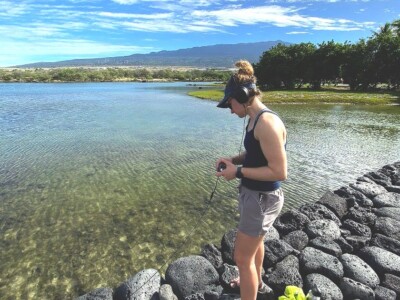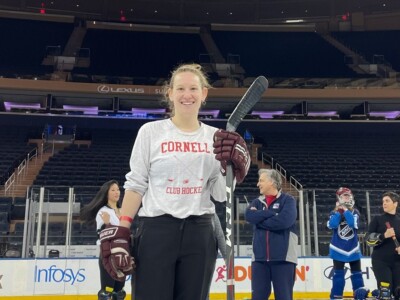If you are lucky enough to spend half an hour with these four dedicated, gracious, and interesting individuals you will learn that they are unique, as well. Go ahead and read their official bios on the election site, but here is a more intimate, lighthearted look at the four candidates, in their own words:
Q: How did you choose Cornell?
Stephanie Fox: I went to a science high school. Cornell has a strong science program. I remember seeing “any person, any study” and I felt that was a great philosophy. Carl Sagan was a professor—that was a huge draw. I also had a mentor, a friend of my family, and he said, “It’s one of the most incredible places I’ve ever been.”
Jonathan Poe: I’d always wanted to be a hard-core engineer. Hosted by COSEP, the Chinese Student Association and the International Students dorm, I visited Cornell and fell in love with the place. (And, yes, it snowed that weekend.) I saw that Cornell was a place where, if I wanted to do anything besides engineering (neuropsychology, astrophysics, journalism, band), I could. We always talk about diversity, but that was a real consideration for me: the diversity of ambitious peers, brilliant professors, extracurricular activities, and stunning vistas. Diversity swayed me to choose Cornell over MIT.
Theresa Flores: I think I had already finished applying to all the universities I was going to apply to, when—sometime in mid-December—we had a student come to our high school and she talked about Cornell. It was not a university I was familiar with. She’d had a great experience, and she said, “We could use more students like you.” I just decided then and there to apply. It was absolutely an easy choice. But it was harder to convince my mom and dad because it was so far way. The price part came into play because I could have practically gone for free if I’d stayed in Texas.
Rob Rosenberg: I have two brothers, and my older brother had gone to SUNY Albany. My parents were sort of pushing me toward the SUNY schools as a matter of cost. We’d made the rounds and were limiting our school search to SUNY schools. We’d gone up to see Binghamton and Dad said, “There are three colleges at Cornell subsidized by the state. Maybe we should take a ride and go see them, too.” We took a ride. We drove along the road at the bottom of Libe Slope. My jaw dropped. After that day, I said, “That’s where I want to go.” It wasn’t just the sheer beauty and size of Cornell, it was the whole experience of the tour and meeting students. I broke my parents in because, a few years later, my younger brother went to Harvard.
Q: What was your favorite class at Cornell?
Theresa Flores: I took a lot of political classes from the Hispanic American Studies program. Those classes opened up new doors for me. I learned about subject matter that hadn’t really been taught during my formative years. My understanding of diversity—and of global diversity—grew. I especially enjoyed the Africana Studies classes on political movements led by African women and even attended a class on the always-evolving relationship between the Black and Jewish communities. Texan history in the ’80s encompassed Mexicans and Anglos. Cornell changed all that.
Rob Rosenberg: When I first came to Cornell, I thought, “I’ll learn how to write and speak and then I’ll go to law school.” Over the course of my time there, I had some amazing professors. Chris Whittle taught classes in advertising and marketing. He helped me get a job at McCann-Erickson, the ad agency handling the Coca-Cola account, which was really cool. Because of that experience, I went into advertising for seven years before becoming a lawyer.
Stephanie Fox: I was a teaching assistant in four classes and enjoyed working with the professors. Don Dermody was a phenomenal professor who taught Human Resources in the hotel school. He had so much wisdom both as a professor and as a person. I learned a lot about people from him. I also TA’d Operations Management and Communications. The last class I TA’d was Facilities Design and that was in its own way very interesting. I felt like I took a deep dive into those [four classes] because I was a teaching assistant. What I loved was working with other students, really helping them. I got a lot of satisfaction from it and probably built on that going forward in my life.
Jonathan Poe: I took many classes where I was probably the only engineer in the class. To become a stellar engineering manager, I took my personnel management courses out of the hotel school vs. JGSM (sorry). While I took them pass-fail, you can guess what grades I got. I got an A+ and could’ve used those six credits of 4.3! Professor Berger still cannot believe how unwise I was.
Q: What’s your favorite aspect of your own leadership style?
Jonathan Poe: As a public-servant leader, I’d have to go with synthesis. A great leader listens, asks insightful questions, and creates astounding followership.
Theresa Flores: I’m pretty much a team builder. I do lead, but I prefer working with teams and in groups. Collaboration is important and was a large part of my student activism at Cornell. I was the Political Action Committee chair for Black Students United and the Student Assembly and played a leadership role in the La Associacion Latina. I had my toes dipped in a lot of places. Today, I’m a lobbyist, but on my own time, I’m involved in public education advocacy work.
Rob Rosenberg: I’m a lawyer. A lot of people have this notion that a lawyer is combative, but I’m a lover, not a fighter. The kind of law that I practice is really about making deals, trying to problem-solve and find common ground. I’m very collaborative, very enthusiastic. I don’t take myself too serious. Developing a personal relationship let’s people know that they can trust you. I try to find a win-win in every situation. I like to have fun. I like to keep things in perspective and have a sense of humor about things. My father died when he was 56 years old. I was 24, right out of Cornell. It really changed my view on life. Life is too short. Every day I try to have fun. I tell my kids every day that I love them. I really try to keep everything in perspective. Challenges are just bumps in the road.
Stephanie Fox: To me, it’s very important to be collaborative, to really listen. It’s an underrated art in our culture, to listen and really understand where people are coming from. Then the goal is to assimilate those different perspectives and work together, that’s the process. Something that I probably do well is help people work together as a team and have people feel part of it.
Q: What calls you to volunteer service?
Stephanie Fox: I have one sibling, a younger sister, but she passed way when she was 33. If something like that happens, it changes your life enormously. You appreciate life in a different way. You realize so much that happens in life isn’t under your control. How you respond to what is happening is the key. I trust that things happen for a reason. We’re here at this time, in this country, where we have so many opportunities that people don’t have in other parts of the world. Being able to have access to Cornell, to its wonderful resources … I’m so grateful. There is a responsibility to give back.
Jonathan Poe: Whether from Christian values of grace, faith, and service, an Asian genetic of education’s value or the Hawaiian spirit of aloha, I have a strong service ethic—the need to pay it forward. My abilities to take initiative, create a tour de force, and pass on that knowledge have been reinforced by Cornell. Many great people—deans, administrators, and staff, starting with Dr. Simmons in COSEP, have encouraged me to volunteer, lead, and transform. It’s fun to build upon Cornell’s merry traditions of excellence.
Rob Rosenberg: Just for me, it’s really because of the role Cornell played in my life. It taught me how to think critically, how to live as a member of a community. I’ve talkedabout this before, but I have had this unbelievable experience with Cornell alumni while I was an undergrad. I became president of my class my freshman year and stayed in that position all through my time there. Because of that role I played through my entire undergraduate experience, I encountered so many alumni who were so kind and generous. I used to think these people with the red jackets and Cornell ties were nuts. Then you realize that something about Cornell gets inside of you and it happens to all of us. You sort of walk out of there so incredibly proud of your Cornell education, so proud to call yourself a Cornellian. I was a CAAAN interviewer and vice president of my class immediately upon graduating. There’s never been a time since then that I haven’t served Cornell in some capacity.
Theresa Flores: The calling has always been there. I volunteered first as a Girl Scout and later became involved in many political campaigns and/or Get Out To Vote movements. In fact, my first political campaign was the Dukakis/Bentsen presidential campaign.
Q: What three things would you take with you to a deserted island?
Rob Rosenberg: If the things can be anything, I would say my wife and my two kids. They are the best thing that ever happened to me. I’m one of those sappy fathers. I completely adore them and can’t get enough time with them. When they wanted to go to sleep-away camp, it was me they had to argue with. I would have missed them too much. They’ve gone to camp, of course, but not for eight weeks. We could weather anything on that deserted island as long as we have each other.
Jonathan Poe: I’ve met many interesting people in my life thus far. Since I’m a people person (vs. an engineering gadget guy), I’d pick people I’ve not yet met: Peter Diamandis, founder of XPRIZE and an optimistic futurist, Elizabeth Holmes, an entrepreneur, founder of Theranos, who is revolutionizing blood analysis, and a satellite phone to call for rescue when we all get bored.
Theresa Flores: Buster and Stella (those are my dogs) and water.
Stephanie Fox: A desert island? I think I would have to be practical and say a solar-powered structure, water filtration system from the AguaClara team, and sustainable crop seeds. All developed at Cornell—of course! If those aren’t available, then a fully loaded Hot Truck.





